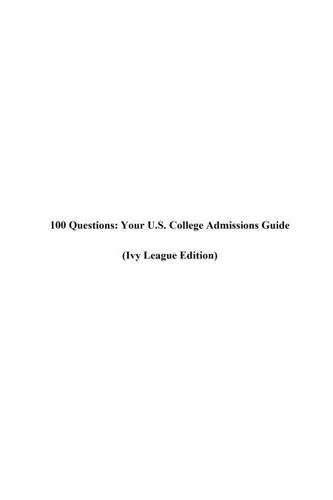Nouveauté
100 Questions: Your U.S. College Admissions Guide (Ivy League Edition)
Par :Formats :
Actuellement indisponible
Cet article est actuellement indisponible, il ne peut pas être commandé sur notre site pour le moment. Nous vous invitons à vous inscrire à l'alerte disponibilité, vous recevrez un e-mail dès que cet ouvrage sera à nouveau disponible.
Disponible dans votre compte client Decitre ou Furet du Nord dès validation de votre commande. Le format ePub est :
- Compatible avec une lecture sur My Vivlio (smartphone, tablette, ordinateur)
- Compatible avec une lecture sur liseuses Vivlio
- Pour les liseuses autres que Vivlio, vous devez utiliser le logiciel Adobe Digital Edition. Non compatible avec la lecture sur les liseuses Kindle, Remarkable et Sony
 , qui est-ce ?
, qui est-ce ?Notre partenaire de plateforme de lecture numérique où vous retrouverez l'ensemble de vos ebooks gratuitement
Pour en savoir plus sur nos ebooks, consultez notre aide en ligne ici
- FormatePub
- ISBN8231401048
- EAN9798231401048
- Date de parution15/09/2025
- Protection num.pas de protection
- Infos supplémentairesepub
- ÉditeurWalzone Press
Résumé
"The U. S. college application process is an enigma"-this sentiment has become near-consensus among applicants. Each admissions cycle, perplexing outcomes abound: students with perfect SAT scores rejected by elite universities, while peers with less stellar grades gain Ivy League acceptance; applicants denied by a top-50 institution but admitted to a top-10 university. These seemingly illogical results often leave families frustrated and bewildered.
This perception of unpredictability stems largely from three cognitive biases:First, rigid mindsets and test-score determinism. Many cling to the belief that "scores dictate everything, " failing to grasp U. S. universities' holistic evaluation standards. To admissions officers, grades are but one factor among many. Second, information asymmetry. Most families possess limited understanding of admissions preferences, policies, and decision-making processes.
They see only surface-level outcomes, not the underlying institutional logic. Third, misinterpretations of U. S. higher education philosophy. Top American universities seek not merely "the best" students, but aim to cultivate a diverse, balanced, and dynamic academic community. To demystify this "enigma" and help applicants unlock doors to the Ivy League and elite institutions, we authored 100 Questions About U.
S. Undergraduate Application. Drawing on in-depth analysis of the above biases, this Q&A guide tackles critical topics-academic planning, extracurricular design, essay writing, school selection, and application documentation-providing clarity for high school students pursuing U. S. undergraduate studies, whether through DIY or semi-DIY approaches.
This perception of unpredictability stems largely from three cognitive biases:First, rigid mindsets and test-score determinism. Many cling to the belief that "scores dictate everything, " failing to grasp U. S. universities' holistic evaluation standards. To admissions officers, grades are but one factor among many. Second, information asymmetry. Most families possess limited understanding of admissions preferences, policies, and decision-making processes.
They see only surface-level outcomes, not the underlying institutional logic. Third, misinterpretations of U. S. higher education philosophy. Top American universities seek not merely "the best" students, but aim to cultivate a diverse, balanced, and dynamic academic community. To demystify this "enigma" and help applicants unlock doors to the Ivy League and elite institutions, we authored 100 Questions About U.
S. Undergraduate Application. Drawing on in-depth analysis of the above biases, this Q&A guide tackles critical topics-academic planning, extracurricular design, essay writing, school selection, and application documentation-providing clarity for high school students pursuing U. S. undergraduate studies, whether through DIY or semi-DIY approaches.
"The U. S. college application process is an enigma"-this sentiment has become near-consensus among applicants. Each admissions cycle, perplexing outcomes abound: students with perfect SAT scores rejected by elite universities, while peers with less stellar grades gain Ivy League acceptance; applicants denied by a top-50 institution but admitted to a top-10 university. These seemingly illogical results often leave families frustrated and bewildered.
This perception of unpredictability stems largely from three cognitive biases:First, rigid mindsets and test-score determinism. Many cling to the belief that "scores dictate everything, " failing to grasp U. S. universities' holistic evaluation standards. To admissions officers, grades are but one factor among many. Second, information asymmetry. Most families possess limited understanding of admissions preferences, policies, and decision-making processes.
They see only surface-level outcomes, not the underlying institutional logic. Third, misinterpretations of U. S. higher education philosophy. Top American universities seek not merely "the best" students, but aim to cultivate a diverse, balanced, and dynamic academic community. To demystify this "enigma" and help applicants unlock doors to the Ivy League and elite institutions, we authored 100 Questions About U.
S. Undergraduate Application. Drawing on in-depth analysis of the above biases, this Q&A guide tackles critical topics-academic planning, extracurricular design, essay writing, school selection, and application documentation-providing clarity for high school students pursuing U. S. undergraduate studies, whether through DIY or semi-DIY approaches.
This perception of unpredictability stems largely from three cognitive biases:First, rigid mindsets and test-score determinism. Many cling to the belief that "scores dictate everything, " failing to grasp U. S. universities' holistic evaluation standards. To admissions officers, grades are but one factor among many. Second, information asymmetry. Most families possess limited understanding of admissions preferences, policies, and decision-making processes.
They see only surface-level outcomes, not the underlying institutional logic. Third, misinterpretations of U. S. higher education philosophy. Top American universities seek not merely "the best" students, but aim to cultivate a diverse, balanced, and dynamic academic community. To demystify this "enigma" and help applicants unlock doors to the Ivy League and elite institutions, we authored 100 Questions About U.
S. Undergraduate Application. Drawing on in-depth analysis of the above biases, this Q&A guide tackles critical topics-academic planning, extracurricular design, essay writing, school selection, and application documentation-providing clarity for high school students pursuing U. S. undergraduate studies, whether through DIY or semi-DIY approaches.



